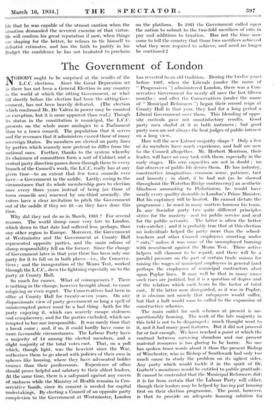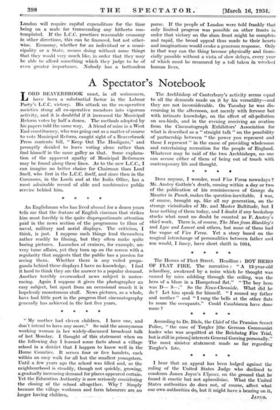The Government of London
NOBODY ought to be surprised at the results of the L.C.C. elections. Since the Great Depression set in there has not been a General Election in any country in the world at which the sitting Government, or what till shortly before the election had been the sitting Gov- ernment, has not been heavily defeated. (The election which confirmed Mr. De Valera in power may be counted an exception, but it is more apparent than real.) Though its status in the constitution is municipal, the L.C.C. presents on the whole more analogies to a Parliament than to a town council. The population that it serves and the revenues that it administers exceed those of many sovereign States. Its members are elected on party lines by parties which scarcely now pretend to differ from the national ones. Further, thanks to the system whereby its chairmen of committees form a sort of Cabinet and a central party direction passes down through them to every branch of the Council's work, the L.C.C. really has at any given time—to an extent that few town councils ever have—a Government in the saddle. Lastly, owing to the circumstance that its whole membership goes to election once every three years instead of being (as those of town councils are) renewed by one-third annually, the voters have a clear invitation to pitch the Government out of the saddle if they see fit—as they have done this time.
Why did they not do so in March, 1931 ? For several reasons. The world slump came very late to London, which down to that date had suffered less, perhaps, than any other region in Europe. Moreover, the Government at Westminster and the Government at County Hall represented opposite parties, and the main odium of slump responsibility fell on the former. Since the change of Government later in that year there has been only one party for it to fall on in both places—i.e., the Conserva- tives ; and the inauguration of the Means Test, worked through the L.C.C., drew the lightning especially on to the party at County Hall. .
So much for causes. What of consequences ? There is nothing in the change, however brought about, to cause misgiving or even regret. The Conservatives had been in office at County Hall for twenty-seven years. On any dispassionate view of party government so long a spell of uninterrupted power must be a bad thing—both for the party enjoying it, which can scarcely escape staleness and complacency, and for the parties excluded, which are tempted to became irresponsible. It was surely time that a break came ; and, if so, it could hardly have come in more favourable circumstances. The Labour Party have a majority of 14 among the elected members, and a slight majority of the total votes cast. That, on a poll which, though light, was the heaviest since the War, authorizes them to go ahead with policies of their own in spheres like housing, where they have advocated bolder courses than their predecessors. Experience of office should prove helpful and salutary to their ablest leaders. At the same time, there is a safeguard against any excess Of rashness white the-Ministry of Health remains in Con- servative sii►ce its ConSerit. is needed for capital undertaki4,S. By electing a touncil of an opposite party complexion to the Government at Westminster, London has reverted to an old tradition. During the twelve years before 1907, when the Liberals (under the name of " Progressives ") administered London, there was a Con- servative Government for nearly all save the last fifteen months ; and after the Conservatives (under the name of " Municipal Reformers ") began their record reign at County Hall in that year, they had for a long period a Liberal Government over them. This blending of oppo- site controls gave not unsatisfactory results. Good party men chafed at it in both instances ; but good party men are not always the best judges of public interest on a long view.
How will the new Labour majority shape ? Only a few of its members have much experience, and half arc new to the Council. altogether. Mr. Herbert Morrison, their leader, will have no easy task with them, especially in the early stages. His own capacities are not in doubt ; no fair observer of public life denies them. He has industry, constructive imagination, common sense, patience, tact and honesty ; in short, if he had not (as he showed throughout the Waterloo Bridge controversy) an aesthetic blindness amounting to Philistinism, he would have nearly every quality desirable in London's Prime Minister. But his captaincy will be limited. He cannot dictate the programme ; he must in many matters humour his team. In any Socialist party two quite different principles strive for the mastery—zeal for public service and zeal for the public servants. The latter is often the better vote-catcher ; and it is probably true that at this election no individuals helped the party more than the school- teachers and other Council employees smarting under " cuts," unless it was some of the unemployed bi►rning with resentment against the Means Test. These active helpers will clamour to be repaid, and there will be a parallel pressure on the part of certain trade unions for raising the wages of municipal employees in general (and perhaps the employees of municipal contractors also) upon Poplar lines. It may well be that in many eases such rises are justified, but it is a question of degree and of the relation which each bears to the factor of total cost. If the latter were disregarded, as it was in Poplar, it is obvious not merely that ratepayers would suffer, but that a halt would soon be called to the expansion of constructive schemes.
The main outlet for such schemes at present is un- questionably housing. The work of the late majority in this field is not to be disparaged ; much thought went to it, and it had many good features. But it did not proceed far or fast enough. We have reached a point at which the contrast between surviving slumdom and our present material resources is too glaring to be borne. No one has spoken truer words about it than the present Bishop of Winchester, who as Bishop of Southwark had only too much cause to study the problem on its ugliest sides. Any party which would tackle it in the spirit of Dr. Garbett's monitions would be entitled to public gratitude. It cannot be contended that the Municipal Reformers did; it is far from certain that the Labour Party will either, though their leaders may be helped by having put housing first on their eleciion programme. The point, however, is that to provide an adequate housing solution for London will require capital expenditure for the time being on a scale far transcending any hitherto con- templated. If the L.C.C. practises reasonable economy in other directions, this can be financed, but not other- wise. Economy, whether for an individual or a muni- cipality or a State, means doing without some things. that they would very much like, in order that they may be able to afford something which they judge to be of even greater importance. Nobody has a bottomless purse. If the people of London were told frankly that only limited progress was possible on other fronts in order that victory on the slum front might be complete and rapid, the broad appeal thus made to their hearts and imaginations would evoke a generous response. Only in that way can the thing become physically and finan- cially possible without a'-vista of slow delays, every year of which must be measured by a toll taken in wrecked human lives.











































 Previous page
Previous page